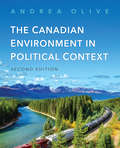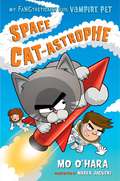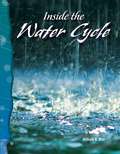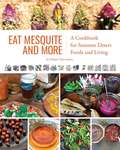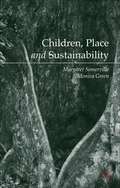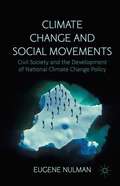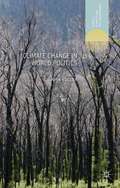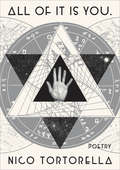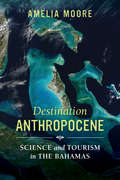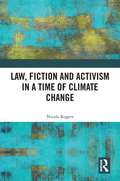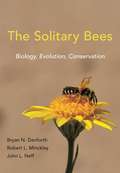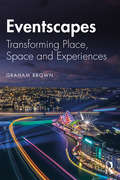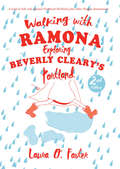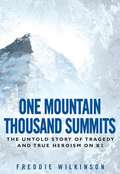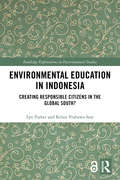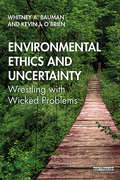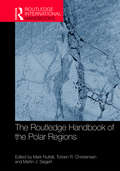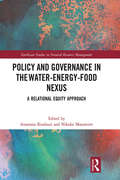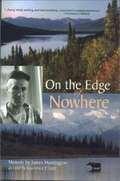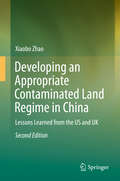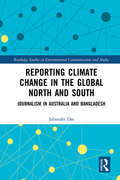- Table View
- List View
The Canadian Environment in Political Context, Second Edition
by Andrea OliveThe Canadian Environment in Political Context uses a non-technical approach to introduce environmental politics to undergraduate readers. First published in 2015, this revised edition features expanded chapters on wildlife, water, pollution, land, and energy. Beginning with a brief synopsis of environmental quality across Canada, this text moves on to examine political institutions and policymaking, the history of environmentalism in Canada, and other crucial issues including Indigenous peoples and the environment, as well as Canada’s North. Enhanced with case studies at the end of each chapter, key words, and a comprehensive glossary, this text addresses the major environmental concerns and challenges that Canada faces in the twenty-first century.
The Lost Scout: A Garth Ryland Mystery (Garth Ryland Mystery #14)
by John RiggsGarth Rylandd, editor of the Oakalla (Wisconsin) Reporter and part-time sleuth, is knocked cold while investigating the scream that disturbed his otherwise peaceful camping trip. Albert Vice, a local factory worker, later turns up dead, leading to Garth's entanglement in an intricate web of violence and deception. When the local lawman is beaten to within an inch of his life while investigating the murder, the burden of solving it is placed squarely on the shoulders of Garth Ryland. Garth's camping ground, the Lost 1600, is the deepest tract of woods in Adams County and is legendary as the haunting ground of the mysterious Lost Scout. But who is the Lost Scout? Is he merely an innocuous legend, a product of superstitious local minds? Or is he truly the boy scout rumored to have disappeared amidst a scream of incomprehensible pain and terror many years ago, still alive and roaming the woods. Garth becomes convinced that the key to Albert's death lies in uncovering the truth about the Lost Scout. Following in the footsteps of Riggs's previous books, The Lost Scout deals with pertinent social topics in this compelling small-town drama. Riggs adeptly grapples with the actions of a right-wing militia and the complications involved in a veteran's attempt to re-enter everyday life. He does this all without compromising the integrity of life in middle America, which he portrays with striking accuracy. In his effort to resolve this mystery Garth comes in contact with an eclectic cast of characters chock full of local color. Ranging from the victim's widow, and Oakalla's resident siren, Kristina Vice to Albert Vice's militia comrades, each character has a different story about the murder and about the identity of the Lost Scout. So who is the Lost Scout? In the end his identity surprises even Garth. Look for more books in the Garth Ryland Series including #1. The Last Laugh, #3. The Glory Hound, #6. Wolf in Sheep's Clothing, #7. One Man's Poison, #8. Dead Letter, #9. A Dragon Lives Forever, #10. Cold Hearts and Gentle People, #11. Killing Frost, #13 He Who Waits.
Space Cat-astrophe (My FANGtastically Evil Vampire Pet #2)
by Mo O'Hara Marek JaguckiIn the second book of this FANGtastic spin-off of Mo O'Hara's New York Times—bestselling My Big Fat Zombie Goldfish chapter book series, an aspiring evil scientist and his mostly evil (and totally forbidden) vampire kitten blast off to Evil Scientist Space Camp. My epic summer has just gotten even more epic, because Evil Scientist Summer Camp just turned into Evil Scientist Space Camp! AND it will be led by the totally epic evil astronaut Neil Strongarm! Who is looking for evil apprentices for his next space mission! Which means that I could totally go into SPACE!!!I’m already well on my way to Evil Emperor of the Camp. Winning this competition should be easy. Okay, so maybe I didn’t expect Geeky Girl to be quite so good at being evil, but I know I’ve got this. All I need is a plan. Hmmm . . . I wonder if you can take evil kittens on space stations.Let the Epic Evil Spaceness begin.Signed, The Great and Powerful Mark
Blizzard! Sudden Storm! (Fountas & Pinnell LLI Red #Level M)
by Anne PhillipsBlizzard!: A sister gets her brother home from school during a blizzard. Sudden Storm: In this true event many duck hunters perish in a sudden storm.
Inside the Water Cycle (Science Readers)
by Science Staff William RiceThe water cycle is like a circle-it has no beginning and no end. When the sun heats ocean water, it evaporates and forms clouds in the sky. When these particles get big enough, they can fall to Earth as precipitation in the form of rain, sleet, snow, or hail. When water hits the ground, it can change to liquid, soak into the ground, or run off and form streams or rivers. But it always makes its way back to the ocean, where the cycle "begins" again.
Eat Mesquite and More: A Cookbook for Sonoran Desert Foods and Living
by Desert Staff<p>Eat Mesquite and More celebrates native food forests of the Sonoran Desert and beyond with over 170 recipes featuring wild, indigenous foods, including mesquite, acorn, barrel cactus, chiltepin, cholla, desert chia, desert herbs and flowers, desert ironwood, hackberry, palo verde, prickly pear, saguaro, wolfberry, and wild greens. The recipes--contributed by desert dwellers, harvesters, chefs, and innovators--capture a spirit of adventure and reverence inviting both newcomers and seasoned experts to try new foods and experiment with new flavors. <p>More than a cookbook, this guide also encourages a renaissance of "wild agriculture," one that foregrounds the ethical harvesting and selection of wild foods and the re-planting of native food sources in urban and residential areas without imported water or fertilizers. It contains stories of significant individuals, organizations, and businesses that have contributed knowledge, products, and innovation in the planting, harvesting, and use of wild, native desert foods. Additional essays reveal the poetry of the foraging life, how to plant the rain, and medicinal uses and ethnobotanical histories of desert plants. <p>Many of the food plants included in this cookbook--or close relatives of them--can be found or grown in the other deserts and drylands of North America and South America. As such, this book becomes a template for harvesting and cooking throughout the Americas. Universally, its concepts and approach can help communities everywhere collaborate with their ecosystem, while enhancing the health of all.</p>
Children, Place and Sustainability
by Monica Green Margaret SomervilleThrough focusing on children's sustainability learning this book examines how school education can address the current environmental problems. It explores children's responses in literacy and language, arts-based approaches, and indigenous studies as well as scientific pedagogies to provide a unique insight into how children learn.
Climate Change and Social Movements: Civil Society and the Development of National Climate Change Policy
by Eugene NulmanClimate Change and Social Movements is a riveting and thorough exploration of three important campaigns to influence climate change policy in the United Kingdom. The author delves deep into the campaigns and illuminates the way policymakers think about and respond to social movements.
Climate Change in World Politics (Energy, Climate and the Environment)
by John VoglerJohn Vogler examines the international politics of climate change, with a focus on the United Nations Framework Convention (UNFCCC). He considers how the international system treats the problem of climate change, analysing the ways in which this has been defined by the international community and the interests and alignments of state governments.
all of it is you.: poetry
by Nico TortorellaA debut poetry collection from actor Nico Tortorella exploring “all of it,” from the smallest cells in our bodies to the outer limits of our universe. Nico Tortorella's debut poetry collection presents a singular voice honed through years as an actor, podcaster, and advocate, one colored with love, wonder, and endless curiosity. But it is also more than just words on a page – it is a sensuous journey into who we are and how we relate to the world around us, showing how the connections we make are vital to understanding why we are here. Provocative, enlightening, and emotionally charged, all of it is you. is a poetry experience like no other.
Destination Anthropocene: Science and Tourism in The Bahamas (Critical Environments: Nature, Science, and Politics #7)
by Amelia MooreDestination Anthropocene documents the emergence of new travel imaginaries forged at the intersection of the natural sciences and the tourism industry in a Caribbean archipelago. Known to travelers as a paradise of sun, sand, and sea, The Bahamas is rebranding itself in response to the rising threat of global environmental change, including climate change. In her imaginative new book, Amelia Moore explores an experimental form of tourism developed in the name of sustainability, one that is slowly changing the way both tourists and Bahamians come to know themselves and relate to island worlds.
Law, Fiction and Activism in a Time of Climate Change
by Nicole RogersThe book examines the narratives of climate change which have developed and which are currently evolving in three areas: law, fiction and activism. Narratives of climate change generated by litigants, judges, writers of fiction and activists are having, and will have, a profound effect on the way we respond to the climate change crisis. Acknowledging the prevalence of unreliable narrators, this book explores the reliability and significance of different forms of climate narrative. The author analyses overlapping themes and points of intersection, considering the recurrent motif of the trickster, the prominence of the child, the significance and ongoing viability of the rights discourse, and the increasingly prevalent emergency framing with its multiple implications for law’s empire. She asks how law, fiction and activism measure up as textual and performative fora for telling the story of climate change and anticipating a climate-changed future. And, in addition, how can they help foster transformative narratives which empower us to confront the climate change crisis? This highly topical, cross-disciplinary work will be of interest to anyone concerned about the growing climate emergency and makes a valuable contribution to climate law, environmental law, the environmental humanities and ecocriticism.
The Solitary Bees: Biology, Evolution, Conservation
by Bryan N. Danforth Robert L. Minckley John L. Neff Frances FawcettThe most up-to-date and authoritative resource on the biology and evolution of solitary beesWhile social bees such as honey bees and bumble bees are familiar to most people, they comprise less than 10 percent of all bee species in the world. The vast majority of bees lead solitary lives, surviving without the help of a hive and using their own resources to fend off danger and protect their offspring. This book draws on new research to provide a comprehensive and authoritative overview of solitary bee biology, offering an unparalleled look at these remarkable insects.The Solitary Bees uses a modern phylogenetic framework to shed new light on the life histories and evolution of solitary bees. It explains the foraging behavior of solitary bees, their development, and competitive mating tactics. The book describes how they construct complex nests using an amazing variety of substrates and materials, and how solitary bees have co-opted beneficial mites, nematodes, and fungi to provide safe environments for their brood. It looks at how they have evolved intimate partnerships with flowering plants and examines their associations with predators, parasites, microbes, and other bees. This up-to-date synthesis of solitary bee biology is an essential resource for students and researchers, one that paves the way for future scholarship on the subject.Beautifully illustrated throughout, The Solitary Bees also documents the critical role solitary bees play as crop pollinators, and raises awareness of the dire threats they face, from habitat loss and climate change to pesticides, pathogens, parasites, and invasive species.
Eventscapes: Transforming Place, Space and Experiences
by Graham BrownEventscapes: Transforming Place, Space and Experiences directly examines the interrelation between events’ simultaneous dependence on and transformation of the places in which they are held. This event–environment nexus is analysed through a variety of international case studies including different kinds of well-known sporting and cultural events such as Vivid Sydney, the Vancouver 2010 Winter Olympics and the Tour Down Under international cycle race, among others. Chapters focusing on visual design explore the opportunities, at different spatial scales, to develop an event ‘look’ and the ways in which an event experience can be enhanced through connecting and engaging with the local culture and community. As well as the planning and management of events, the book draws on event experience, dramaturgically examining the roles played by authors, actors and the audience, and emphasises the participation of multiple groups in the co-creation of event experiences. This will be invaluable reading for those studying events and the environment. Adopting a multidisciplinary approach, it also draws on geography, urban and cultural studies, image studies, architecture and design, environmental psychology, and event management, and will be of use to a broad academic audience.
Walking with Ramona: Exploring Beverly Cleary's Portland (People's Guide Ser.)
by Laura O. FosterThis unique travel guide explores the streets, schools, characters, and neighborhoods of author Beverly Cleary’s Portland. With this new and most unusual guidebook, readers can walk the very sidewalks that Beverly walked and climb the very school steps that Beverly climbed. You'll see the grocery parking lot where Ramona got stuck in the mud, the park lawn where Henry Huggins hunted nightcrawlers, and the real Portland street that became Klickitat Street, their fictional home. Beverly Cleary’s Portland was much different than the Portlandia of today. Walking with Ramona brings to life what 1920s and 1930s Portland was like for the “girl from Yamhill” who went on to become an internationally beloved author. Characters like Ramona and Beezus, Henry and Ribsy, and Ellen and Austine come to life on this hour-long walking route through the Northeast Portland neighborhood where Beverly grew up.
One Mountain Thousand Summits: The Untold Story of Tragedy and True Heroism on K2
by Freddie WilkinsonAn insider's account of one of the deadliest and most controversial tragedies in mountaineering history-the 2008 K2 disaster. When eleven men perished on the slopes of K2 in August 2008, it was one of the deadliest single events in Himalayan climbing and made headlines around the world. Yet non of the surviving western climbers could explain precisely what happened. Their memories were self-admittedly fogged by exhaustion, hypoxia, and hallucinations. The truth of what happened lies with four Sherpa guides who were largely ignored by the mainstream media in the aftermath of the tragedy, who lost two of their own during the incident, and whose heroic efforts saved the lives of at least four climbers. Based on his numerous trips to Nepal and in-depth interviews he conducted with these unacknowledged heroes, the other survivors, and the families of the lost climbers, alpinist and veteran climbing writer Freddie Wilkinson presents the true story of what actually occurred on the "savage" mountain. This work combines a criticism of the mainstream press's less-than-complete coverage of the tragedy and an insightful portrait of the lives of 21st-century Sherpas into an intelligent, white-knuckled adventure narrative. .
Environmental Education in Indonesia: Creating Responsible Citizens in the Global South? (Routledge Explorations in Environmental Studies)
by Lyn Parker Kelsie Prabawa-SearIndonesia’s wealth of natural resources is being exploited at breakneck speed, and environmental awareness and knowledge among the populace is limited. This book examines how young people learn about the environment to see how education can help to develop environmental awareness and avert vast environmental destruction, not only in Indonesia, but also in the Global South more generally. Based on in-depth studies conducted in the cities of Yogyakarta and Surabaya, complemented with surveys of students in secondary schools, Environmental Education in Indonesia examines educational curricula, pedagogy and "green" activities to reveal what is currently being done in schools to educate children about the environment. The book investigates the shortcomings in environment education, including underqualified teachers, the civil service mentality, the still-pervasive chalk-and-talk pedagogy and the effect of the examination system. It also analyses the role of local government in supporting (or not) environmental education, and the contribution of environmental NGOs. The book establishes that young people are not currently being exposed to effective environmental education, and the authors propose that the best and most culturally appropriate way forward in Indonesia is to frame pro-environment behaviour and responsibility as a form of citizenship, and specifically that environmental education should be taught as a separate subject. This book will be of great interest to students and scholars of contemporary Indonesia and Southeast Asia, education for sustainability and environmental education, as well as sustainability and sustainable development more generally.
Environmental Ethics and Uncertainty: Wrestling with Wicked Problems
by Whitney A. Bauman Kevin J. O'BrienThis book offers a multidisciplinary environmental approach to ethics in response to the contemporary challenge of climate change caused by globalized economics and consumption. This book synthesizes the incredible complexity of the problem and the necessity of action in response, highlighting the unambiguous problem facing humanity in the 21st century, but arguing that it is essential to develop an ethics housed in ambiguity in response. Environmental Ethics and Uncertainty is divided into theoretical and applied chapters, with the theoretical sections engaging in dialogue with scholars from a variety of disciplines, while the applied chapters offer insight from 20th century activists who demonstrate and/or illuminate the theory, including Martin Luther King, Rachel Carson, and Frank Lloyd Wright. This book is written for scholars and students in the interdisciplinary field of environmental studies and the environmental humanities, and will appeal to courses in religion, philosophy, ethics, politics, and social theory.
The Routledge Handbook of the Polar Regions (Routledge International Handbooks)
by Mark Nuttall Torben R Christensen Martin SiegertThe Routledge Handbook of the Polar Regions is an authoritative guide to the Arctic and the Antarctic through an exploration of key areas of research in the physical and natural sciences and the social sciences and humanities. It presents 38 new and original contributions from leading figures and voices in polar research, policy and practice, as well as work from emerging scholars. This handbook aims to approach and understand the Polar Regions as places that are at the forefront of global conversations about some of the most pressing contemporary issues and research questions of our age. The volume provides a discussion of the similarities and differences between the two regions to help deepen understanding and knowledge. Major themes and issues are integrated in the comprehensive introduction chapter by the editors, who are top researchers in their respective fields. The contributions show how polar researchers engage with contemporary debates and use interdisciplinary and multidisciplinary approaches to address new developments as well as map out exciting trajectories for future work in the Arctic and the Antarctic. The handbook provides an easy access to key items of scholarly literature and material otherwise inaccessible or scattered throughout a variety of specialist journals and books. A unique one-stop research resource for researchers and policymakers with an interest in the Arctic and Antarctic, it is also a comprehensive reference work for graduate and advanced undergraduate students.
Policy and Governance in the Water-Energy-Food Nexus: A Relational Equity Approach (Earthscan Studies in Natural Resource Management)
by Anastasia Koulouri Nikolai MouravievThis book discusses the balance of priorities within the Water-Energy-Food (WEF) nexus and its impact on policy development and implementation, highlighting innovative perspectives in adopting a holistic approach to identify, analyse and manage the nexus component interdependencies. Due to increasing demands for natural resources, the WEF nexus has emerged as a response to the numerous global challenges. Addressing WEF challenges often involves balancing multiple and competing priorities and identifying and managing interrelations, synergies and trade-offs between the three components of the nexus. In this volume the authors focus on the dynamics between multiple stakeholders, such as governments, businesses, NGOs and local communities, when addressing WEF challenges by adopting a nexus approach. The book argues that effective engagement of multiple stakeholders can address difficulties arising from the introduction of an integrated approach to WEF policy design and implementation, increasing the potential benefits. The book also looks at the effect of international relations and regional power struggles on resolving cross-border WEF nexus issues. Case studies are drawn from Kenya, Central Asia, USA and Peru, highlighting key themes, such as how collaborative governance, enabled and facilitated by relational equity management, can be viewed as an innovative way to reconcile competing priorities. The combination of theoretical and case study chapters makes the book of interest to a wide audience, including scholars and advanced students of sustainable development, agriculture and food studies, water and energy policy design and governance, as well as to practitioners working in the fields of water, energy and food security.
On the Edge of Nowhere
by James HuntingtonHis father is a white trapper, his mother an Athabascan Indian who walks a thousand miles in winter to reunite with her family. Thus, Jimmy Huntington learns early how to survive on the land. Huntington is only seven when his mother dies, and he must care for his younger siblings. A courageous and inspiring man, Huntington hunts wolves, fights bears, survives close calls too numerous to mention, and becomes a championship sled-dog racer.
Developing an Appropriate Contaminated Land Regime in China: Lessons Learned From The Us And Uk
by Xiaobo ZhaoLike all industrialized countries, China has encountered increasing problems with land contamination in recent years. Abandoned mining and manufacturing sites and obsolete industrial complexes, while also creating new polluting industrial enterprises, represent impending environmental threats. More importantly, a number of social and economic problems have developed and must be dealt with, in some cases urgently. Contaminated land laws and regulations have been established and have evolved in the US and UK and many other jurisdictions over the past few decades. These regimes have substantially influenced the relevant legislation in the context of numerous Asian and European countries and will inevitably benefit similar legislative efforts in China. This book is the first monograph that focuses on how China can learn from the US and UK with respect to contaminated land legislation and comprehensively illustrates how contaminated land law could be created in China. It will be of interest to academics and practitioners in environmental law in China, as well as the US and UK.
Reporting Climate Change in the Global North and South: Journalism in Australia and Bangladesh (Routledge Studies in Environmental Communication and Media)
by Jahnnabi DasThis book reveals how journalists in the Global North and Global South mediate climate change by examining journalism and reporting in Australia and Bangladesh. This dual analysis presents a unique opportunity to examine the impacts of media and communication in two contrasting countries (in terms of economy, income and population size) which both face serious climate change challenges. In reporting on these challenges, journalism as a political, institutional, and cultural practice has a significant role to play. It is influential in building public knowledge and contributes to knowledge production and dialogue, however, the question of who gets to speak and who doesn’t, is a significant determinant of journalists’ capacity to establish authority and assign cultural meaning to realities. By measuring the visibility from presences and absences, the book explores the extent to which the influences are similar or different in the two countries, contrasting how journalists’ communication power conditions public thought on climate change. The investigation of climate communication across the North-South divide is especially urgent given the global commitment to reduce greenhouse gas emissions and it is critical we gain a fuller understanding of the dynamics of climate communication in low-emitting, low-income countries as much as in the high emitters, high-income countries. This book contributes to this understanding and highlights the value of a dual analysis in being ably draw out parallels, as well as divergences, which will directly assist in developing cross-national strategies to help address the mounting challenge of climate change. This book will be of great interest to students and scholars of climate change and environmental journalism, as well as media and communication studies more broadly.
How Does a Tree Help? (Into Reading, Level B)
by David Bauer<p>NIMAC-sourced textbook <p>All kinds of animals make their homes in trees. Children do, too!</p>
